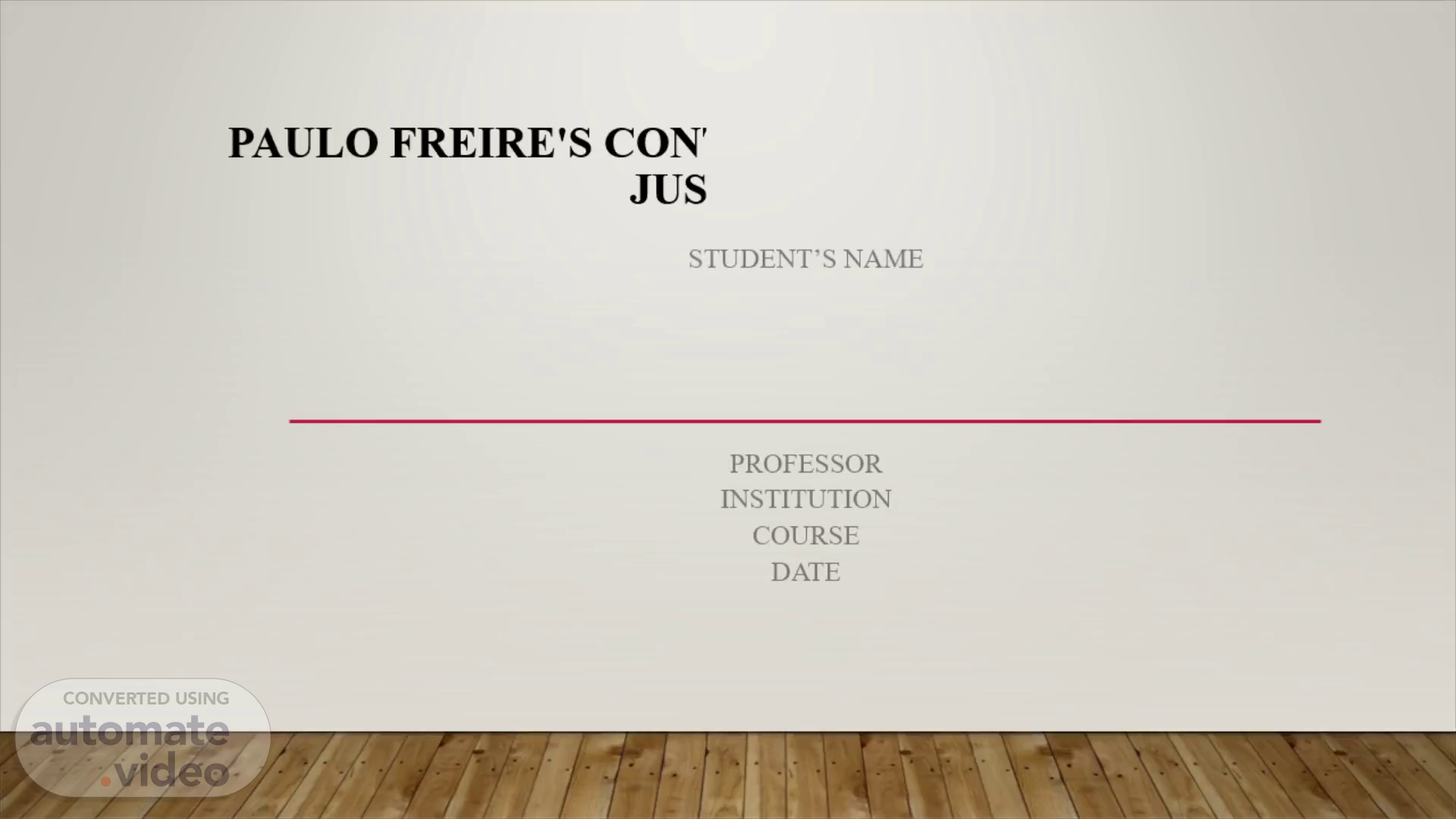
Paulo Freire's Contributions to Social Justice.
Scene 1 (0s)
Paulo Freire's Contributions to Social Justice.. Student’s Name Professor Institution Course Date.
Scene 2 (8s)
%%. Paulo Freire was a Brazilian educator, philosopher, and political activist who was one of the most influential thinkers in the field of social justice. He is best known for his work on critical pedagogy, which is an approach to teaching and learning that places emphasis on self-reflection, dialogue, and critical analysis of power relations. He has been described as “the father of critical pedagogy” and is widely considered to be one of the most influential figures in education..
Scene 3 (31s)
Biography. Freire was born in 1921, in Recife, Brazil. He graduated from the University of Recife with a law and philosophy degree in 1943, and the University of Sao Paulo awarded him a doctorate in philosophy in 1959. In the 1950s and 1960s, he taught philosophy and education at the University of Recife, where he established his theories on critical pedagogy (Kohan,2021). While working as a teacher in a depressed rural area of Brazil, Freire was confronted with the terrible realities of oppression and poverty. This encounter had a significant impact on Freire, and it was at this point that he started to formulate his theories on critical pedagogy. As a government consultant for Brazil in the early 1960s, Freire sought to create educational initiatives for the underprivileged and disenfranchised (Roberts, 2022). After the Brazilian government was overthrown by a military revolution in 1964, Freire was detained and forced to leave the country. Freire continued to write and teach while he was exiled, and he ultimately returned to Brazil in 1980. Freire was a fervent supporter of social justice throughout his career, and he never stopped writing and speaking on how education can change people's lives and entire communities..
Scene 4 (1m 19s)
Critical Pedagogy. Critical pedagogy, which Freire characterized as a "participatory, critically reflective approach to education that aspires to empower students to confront and reform repressive social institutions," is the main emphasis of Freire's work (Corbett et al.,2021). Assuming that learners are "empty vessels" to be filled with information by the teacher, he said that traditional educational institutions are founded on a banking system of teaching. Instead, Freire called for a more dialogic approach to teaching and learning that involves students in critical reflection and debate. He said that this technique is ineffectual and can be repressive. Additionally, Paulo Freire's famous contribution to the field of social justice and ethical theory is his book, Pedagogy of the Oppressed (Freire, 2020). In this book, he argued for a more dialogical approach to education, in which students are encouraged to think critically and engage in dialogue with the teacher and the material being studied. He also argued for the importance of including people from all backgrounds in the education process and for using education as a tool for social transformation ..
Scene 5 (2m 4s)
Other Contributions. In addition, Freire wrote and thought a much on social justice, oppression, and freedom. He wrote a lot on racism, misogyny, and other types of oppression. His writings had a big impact on the rise of liberation theology, a school of thought within Christianity that stresses the importance of faith in bringing about the freedom of the oppressed (Freire, 2020). He also argues that education should be focused on developing a sense of solidarity between students and teachers and that it should be used as a tool for social transformation..
Scene 6 (2m 29s)
Legacy. The work of Freire has had a long-lasting influence on pedagogy, social justice, and education. Around the world, educators, activists, and academics have adopted his ideas. Along with being referenced in various international declarations and treaties, his work has also been utilized to shape policy choices. He is regarded as a visionary thinker who contributed to the way we see social justice and education. His work on liberation theology has had an impact on the growth of the social justice movement, and his theories on critical pedagogy have been extensively embraced in the field of education. He is regarded as one of the most significant theorists in the area of social justice, and his ideas are still relevant today..
Scene 7 (3m 1s)
References. Corbett, J., & Guilherme, M. (2021). Critical pedagogy and quality education (UNESCO SDG-4): the legacy of Paulo Freire for language and intercultural communication. Language and Intercultural Communication, 21(4), 447-454. Freire, P. (2020). Pedagogy of the oppressed. In Toward a sociology of education (pp. 374-386). Routledge. Freire, P. (2020). Pedagogy of the Oppressed: Pedagogy of the oppressed. In The Community Performance Reader (pp. 24-27). Routledge. Kohan, W. O. (2021). Paulo Freire: A philosophical biography. Bloomsbury Publishing. Roberts, P. (2022). Paulo Freire: philosophy, pedagogy, and practice. Shapiro, E. R., & Little, T. V. (2020). Inclusive leadership development through participatory inquiry: Cultivating cultural humility. In The Routledge companion to inclusive leadership (pp. 356-371). Routledge..